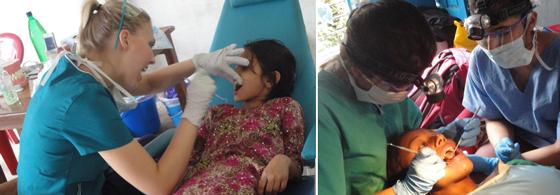
Work the World's Dental Outreach Projects highlight the problem of oral health within rural communities in the developing world.
With 76% of Nepalese people in need of dental treatment it's a programme that both students and qualified dentists are keen to be involved in.
The Dental Outreach Projects run throughout June, July and August each year, with teams of up to 12 dental students and qualified dentists heading out to screen, treat and educate in remote communities that have little or no access to dental healthcare.
Working under the supervision of an in-country professional dentist, students and qualified dentists are able to help those who need it most, without compromising the safety of the patients or themselves. Work the World provides all dental equipment for the projects but gloves and anti-bacterial gel can be in short supply so often participants bring their own too.
Since 2010 Work the World has facilitated 11 Dental Outreach Projects in Nepal with a further four going ahead in 2013. Extensive work is done in advance to ensure local communities know of the free clinic so, despite their rural locations, every morning it is common for volunteers to be greeted by a queue of people snaking through the village waiting their turn.
One of 2012's participants explained that 'the first morning my partner and I screened, it became clear we were going to have enough patients and treatment to be getting on with. In the screening room we made a treatment plan for each patient and gave oral hygiene advice, we then sent the patient to the treatment room to undergo their procedures. Some patients had never used a toothbrush before, so we had to go through all the basic instructions.'
And it's worth staying; over 2,000 villagers were screened by the Work the World volunteer teams in 2012 alone.
Operations manager Charlotte explains why there is such a demand: 'For many rural communities, like Phumdi Bhumdi, the site of our first Nepal project in 2012, the trip required to reach a hospital for treatment is long and costly and made in emergencies only. Oral and dental health is not considered a priority. At the same time, a lack of education about basic preventive measures as well as delays in presenting mean large numbers of the community suffer from advanced pathologies, severe decay and poor oral hygiene.'
Limited resources
Volunteers on the project face not only different dental challenges but a hugely contrasting clinical environment. Final year student Emily found that 'due to the basic set up of the clinic, restorations proved more difficult than at university, but this was something that you rapidly adapted to. There were occasions when the generator would temporarily fail and this is when you were glad you had decided to pack your head torch!'.
For many of the programmes' participants, the chance to get hands-on work, as well as see advanced pathologies, is the main reason for an elective or placement in the developing world. Often, patients had been suffering with recurrent pain and inflammation for a number of years before the source of infection was removed.
Helen who completed her placement in Raniban last year explains: 'most patients suffered from caries and most molars were affected. They required either extraction, root canal or a restoration. If root canal was required our head tutor referred them to the Regional Hospital in Pokhara as we did not have an X-ray machine. In the afternoon my treatment consisted of mainly restorations, usually amalgam and extractions.'
Working with professionals from another country is another huge benefit. Often at home, technology and a variety of equipment are relied on, but in the clinics the focus is on manual skills and minimal resources. A surprise challenge was a forced lowering in standards of dental practice. Infection control simply cannot be maintained in a temporary clinic miles away from the nearest large town.
Helen also explains that 'the standard of disinfection was not the same as in UK, after extraction we use a brush and disinfecting water to clean any blood off and then put it into a bucket of disinfectant for ten minutes and instrument and burs also went in the bucket for ten minutes. We used different masks, gloves and needles for each patient.'
Creating sustainable projects is something which is hugely important to Work the World and Rob Giddings, Head of Operations said: 'While the projects do incredible work for the time they are there, we feel it's really important for our programmes to be sustainable. We do everything we can to educate the community while the temporary clinics are open and focus on the importance of looking after teeth and gums. We will continue to look at what else we can do to ensure the communities maintain good oral health.'
Work the World has four Dental Outreach Projects throughout June, July and August 2013 with limited spaces still available.
If you would like to find out more about the projects visit worktheworld.com.au or email [email protected] to contact a member of the team.